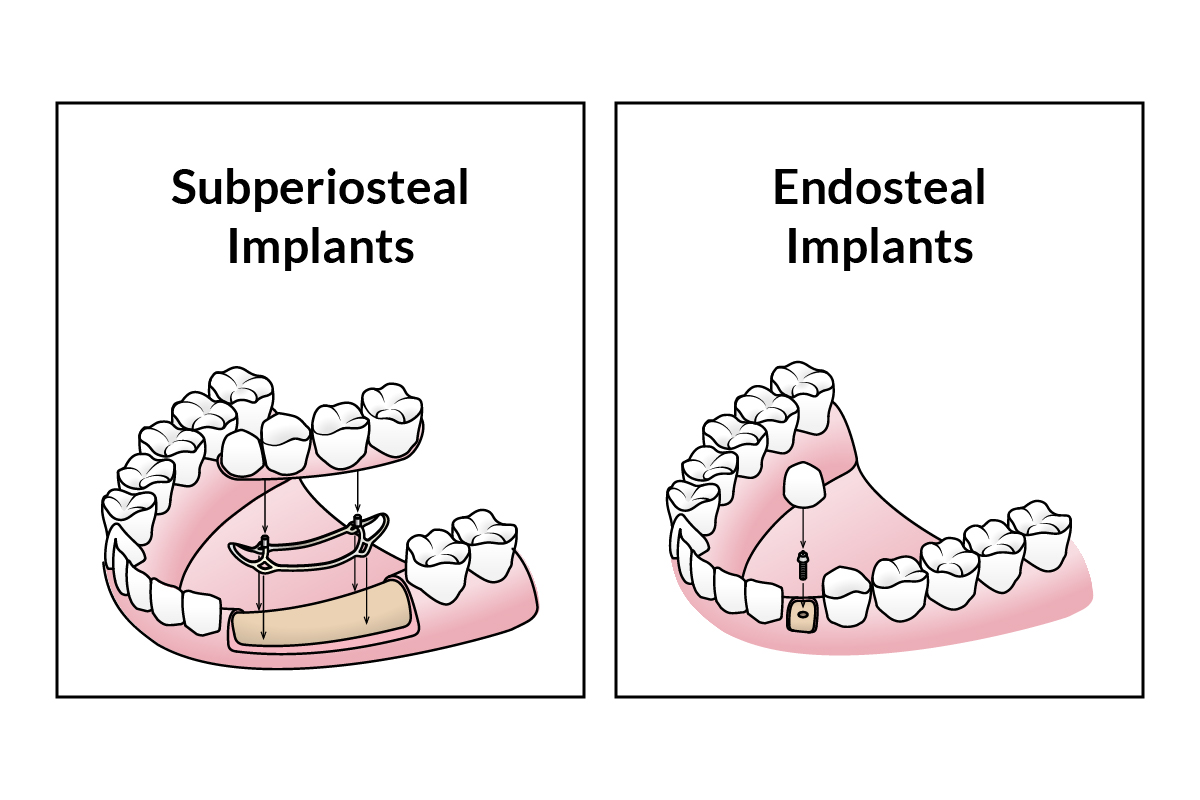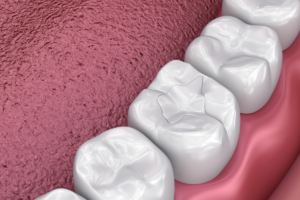Dental implants are very popular, and a godsend to those who wish to restore their captivating smiles, as well as those who look for a safer, more durable and natural option than traditional dentures. There are different dental implant types, however. Each type is chosen based on the patient’s needs and specific conditions, how much they are willing to pay, or what their surgeon recommends would work best for them. This article goes through different dental implant types and talks about what your options are if you are considering opting for these revolutionary dental prostheses.
What Is a Dental Implant?

Dental implants are dental prostheses placed on, through, or into the jawbone by a dental surgeon, in order to replace one or more missing teeth. The most common type of dental implants, which we will get to shortly, comes with an abutment and a custom-made crown. The abutment connects the crown to the implant, and is often made out of titanium or zirconia (ceramic). The crown itself is made to fit the patient’s mouth and match the color of their natural teeth. Dental crowns are typically made from porcelain, metal, or resin. But there are other dental implant types out there that you might want to know more about.
How Many Dental Implant Types Are There?
There are generally two very common types of dental implants, Endosteal and Subperiosteal:
Endosteal implants are inserted into the bone and are the most common type of implants. A surgeon places these implants in the jawbone. Each Endosteal implant can hold one or more artificial teeth. This article helps you know more about Endosteal implant procedure.
Subperiosteal implants are placed below the gum, but on top of the jaw using metal frames. These frames are typically composed of cobalt, chrome, and an essential trace mineral named molybdenum. Subperiosteal dental implants are designed for patients whose jawbone does not have enough height for an endosteal implant.
Although these two dental implant types are the most common, there are yet two other, less common types:
Zygomatic implants, that are inserted at an angle into the zygomatic bone (commonly referred to as the cheekbone). These implants are designed for patients with significant bone loss in the upper jaw. Just like traditional dental implants, zygomatic dental implants have a high success rate and can last for a long time.
Transosteal implants, that are inserted through the jaw bone itself to support a mandibular denture. These types of implants are less common, requiring a very complicated surgery and a highly skilled dental surgeon. Transosteal implants are the implant of choice for the patients who have suffered severe resorption, and lack enough bone to support other dental implant types.
What Are The Most Common Endosteal Dental Implant Types?
Since Endosteal dental implants are the most common among different dental implant types, this section talks about the materials used in these dental implants. As mentioned earlier, the materials of choice for abutments are titanium and zirconia, both of which are FDA-approved. Below you can read the pros and cons for each of them:
Titanium

Titanium and its alloys are the most widely used materials for implant abutments. Because the abutment is inserted into the jawbone and is expected to eventually fuse with the bone, titanium is often coated with a synthetic bone substitute that mainly consists of natural bone. This synthetic material is called hydroxyapatite (HA). HA forms a biochemical bond with the bone and becomes part of the jawbone over time. That said, titanium has its own pros and cons, some of which are listed below:
Pros:
Extreme durability
Titanium has the highest strength to weight ratio out of all metals, making it a great choice for abutments that are inserted into the jawbone, as it can last for years.
Ability to attach to bone (Osseointegration)
Once healed, titanium implants last a long time; they can even stay in your jawbone permanently if you practice good oral hygiene, take proper care of your implant(s), and schedule regular checkups with your dentist or oral surgeon.
Affordability
Titanium implants cost less to manufacture; therefore, they are less expensive than their zirconia counterparts, which is a big plus for a lot of patients.
Bio-compatibility
As titanium has a low electrical conductivity, once inserted into the bone a thin oxide layer is formed on the implant, making it very resistant to corrosion.
Cons:
Risk of allergic reactions
Though quite rare, some people do develop an allergy to their titanium implant. Therefore, if you have a history of allergies to metal, consult with your doctor. They might want to run an allergy test prior to the implant procedure.
Titanium toxicity
This one is also rare, but once it occurs, it can cause bone inflammation and bone loss, leading to dental implant failure. Symptoms include fatigue, headaches, blurred vision, pain and swelling. Contact your oral surgeon if you develop any of these symptoms.
Implant failure
Titanium implants might fail to bond with the jawbone if the candidate has such underlying health conditions as diabetes, cancer, alcoholism, or excessive smoking. Of course, implant failure can happen with any type of dental implants and is not just limited to titanium ones.
Zirconia

Though relatively new, zirconia implants have become quite popular due to the advantages they offer over titanium implants. They do cost more, so you need to consult your oral surgeon and make an informed decision before opting for these dental prostheses. Check out this article on our website if you want to learn more about zirconia dental implants and why they have created a buzz in the field of dentistry. Zirconia implants too have their own pros and cons, some of which being:
Pros:
Natural looking
Due to their white color, zirconia implants will look just like your natural teeth.
Allergy free
Because they are metal-free, zirconia implants cause no allergic reactions; therefore, they are perfect for people with metal allergies.
Osseointegration
Zirconia implants integrate better with the jawbone, allowing it to firmly fuse with the implant.
Bio-compatibility
Zirconia dental implants are even more bio-compatible than their titanium counterparts, making them a more favorable option when it comes to choosing one of the two dental implant types.
Plaque collection
Compared to titanium implants, zirconia implants have a lower risk of plaque formation around the implant, making them a healthier choice.
Cons:
Degradation
Their strength can degrade as the implants age.
Placement issues
If not carefully placed in the ideal location, zirconia implants could potentially cause complications.
Lack of literature
The majority of the studies on zirconia implants are short-term ones, and we need more long-term studies to say with certainty that zirconia can replace titanium.
Which one of these dental implant types do holistic dentists recommend?
Although titanium dental implants are durable and have long been tried and tested, holistic dentists recommend zirconia dental implants, mainly due to their being bio-compatible, metal-free, and non-corrosive. Located in Orange County, California, Aria Dental offers a variety of holistic dental services, including zirconia dental implants. Call us today if you want to schedule an appointment and learn more about these two dental implant types. We will happily help you make an informed decision!



















